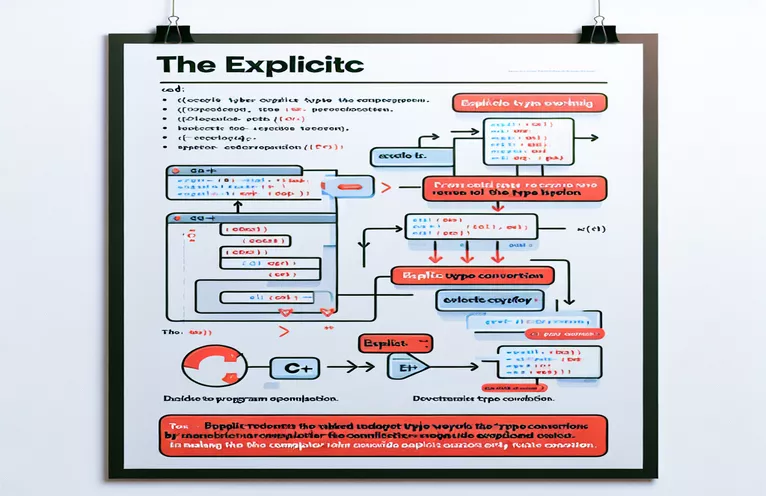Introduction to the 'explicit' Keyword in C++
The 'explicit' keyword in C++ is an important feature for developers looking to avoid inadvertent type conversions, which can lead to problems and unpredictable behavior in programs. It helps to make constructor calls more intentional, which improves code clarity and maintenance.
This article investigates the meaning of the 'explicit' keyword, its application, and practical examples to demonstrate its significance in modern C++ programming. Developers can design more robust and error-free code if they understand and apply 'explicit' correctly.
| Command | Description |
|---|---|
| explicit | C++ constructors are protected from implicit conversions and copy-initialization. |
| std::cout | The standard output stream in C++ is used to print messages to the console. |
| <iostream> | The header file defines the standard input and output stream objects. |
| Complex(int real, int imag = 0) | Constructor for the Complex class that sets up the real and imaginary portions. |
| Fraction(int numerator, int denominator = 1) | The Fraction class's constructor initializes the numerator and denominator. |
| display(const Complex& c) | Function for displaying information about a complex item. |
Understanding the implementation of 'explicit' in C++.
In the first script, we define a class called Complex to represent a complex integer. To prevent implicit conversions, this class's constructor is tagged with the explicit keyword. Using explicit restricts the creation of Complex objects to direct initialization. This implies that the sentence Complex c1(10, 5); is valid, but Complex c2 = 20; will cause a compilation error. The display function displays information on a Complex object. This example shows how explicit prevents inadvertent type conversions, which could result in logical problems in the program.
The second script contains a class called Fraction, which represents a fraction. Similarly to the Complex class, the Fraction constructor is denoted with the explicit keyword. This prevents implicit conversion from an integer to a Fraction by requiring the object to be initialized with particular numerator and denominator values. The Fraction class contains a print method for displaying the fraction. The main function displays proper initialization of a Fraction object and emphasizes the compilation fault that happens when implicit conversion is tried. These examples demonstrate the significance of utilizing explicit to keep code clear and prevent potential problems.
Exploring the 'explicit' Keyword in C++
C++ Programming Example
#include <iostream>class Complex {public:explicit Complex(int real, int imag = 0) : re(real), im(imag) {}private:int re, im;};void display(const Complex& c) {std::cout << "Complex number" << std::endl;}int main() {Complex c1(10, 5);display(c1);// Complex c2 = 20; // This will cause a compilation errorreturn 0;}
Using 'explicit' for Safe Type Conversion
C++ Programming Example
#include <iostream>class Fraction {public:explicit Fraction(int numerator, int denominator = 1): num(numerator), denom(denominator) {}void print() const {std::cout << num << '/' << denom << std::endl;}private:int num, denom;};int main() {Fraction f1(3, 4);f1.print();// Fraction f2 = 5; // This will cause a compilation errorreturn 0;}
The Importance of 'explicit' in Avoiding Ambiguities in C++
The explicit keyword also prevents ambiguity in overloaded functions, which is an important feature. When functions are overloaded, the compiler may struggle to decide which one to call if implicit conversions are permitted. Developers can avoid confusion by marking constructors with explicit. This ensures that the proper function is called. This is especially significant in large codebases where many constructors and overloaded functions are prevalent. The explicit keyword maintains the integrity of function calls, guaranteeing that the intended constructor is utilized without any unintentional conversions.
Additionally, explicit improves code readability and maintainability. When other developers see the code, they will quickly realize that some constructors should not be called implicitly. This decreases the likelihood of issues introduced by future changes to the codebase. Furthermore, explicit constructors make it evident when a specific initialization is necessary, fostering good coding standards and more resilient software development. By requiring explicit initialization, developers can write more predictable and intelligible code, resulting in higher-quality software.
Common Questions About C++'s 'explicit' Keyword
- What is the use of the explicit keyword?
- The explicit keyword prevents implicit type conversions and ensures that constructors are called intentionally.
- When should I use the keyword explicit?
- Use explicit to prevent implicit conversions that could lead to unclear or accidental function calls.
- Can I use explicit in any constructor?
- Yes, explicit can be used with any constructor to control object initialization and prevent implicit conversions.
- What happens when I don't use explicit?
- If you don't use explicit, the compiler may enable implicit conversions, resulting in unexpected behavior and issues.
- Does explicit affect performance?
- No, the explicit keyword doesn't effect performance. It is a compile-time command that controls how the compiler interprets the code.
- Can explicit be applied to conversion operators?
- Yes, explicit can be used with conversion operators to prevent implicit type conversions, much like with constructors.
- Is the explicit keyword only for C++?
- explicit is unique to C++, but comparable notions exist in other programming languages to manage type conversions and assure code readability.
- How does explicit make code more maintainable?
- explicit prevents implicit conversions, resulting in more predictable and understandable code, making it easier to maintain and extend.
Explaining the Importance of 'explicit' in C++
The explicit keyword in C++ is an effective tool for eliminating implicit type conversions and ensuring constructors are called intentionally. Using explicit allows developers to write clearer, more maintainable code while avoiding potential errors caused by unintentional conversions. Understanding and properly implementing the explicit keyword is crucial for constructing robust and reliable C++ applications.


